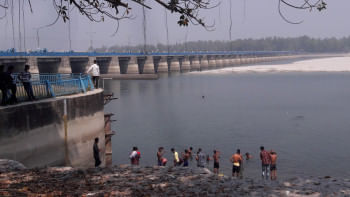Lack of progress on Teesta water sharing deal is frustrating

It is little wonder that any positive outcome from the PM's recent visit to India has been largely overshadowed by a palpable frustration over the lack of progress on the longstanding Teesta water-sharing issue. Overall, as a former ambassador has put it, the two-day visit was "long on visions but short on details." And one glaring shortage or rather omission in the joint statement issued afterwards was that of the Teesta water-sharing agreement, which has remained pending for 13 years despite assurances from India's highest level. The issue didn't even appear to feature in the talks. Instead, we have learnt of India's interest in a megaproject to manage Teesta River inside Bangladesh, where China's pre-existing interest would more likely complicate things going forward.
But before it becomes another geostrategic battleground for the regional superpowers, we must ask ourselves: what does the project mean for the future of the Teesta water-sharing agenda? Reportedly, it will involve dredging the river, building embankments, setting up townships and industries, irrigation, etc. Clearly, it has its benefits, if planned and executed properly, but can focusing on only one part of a transboundary river resolve the water crisis facing downstream Bangladesh, with upstream India unilaterally controlling its flow? Will India's potential involvement in the project overshadow the water-sharing agenda? Although the PM has said there is no link between the two, concerns remain.
It is, therefore, vital that while the government scrutinises all aspects related to the project, including the viability of massive investments, it also keeps demanding results from India on the water-sharing issue. Bilateral talks during the visit also involved various other issues, with the two countries signing and renewing some agreements. One of the issues that drew significant speculations is rail connectivity, which the PM too addressed in her media briefing. The question that's being raised is, how much of it will really benefit Bangladesh? While greater regional connectivity via rail and road is important and should ideally benefit both Bangladesh and India, experts say the rail transit as it is being conceptualised will mostly benefit India.
There seems to be a widespread perception in Bangladesh that whatever connectivity projects have been implemented over the last few years have benefitted India more than they did Bangladesh, allowing the former greater and more strategic passage. Examples of Europe's rail connectivity clearly do not apply if the interests of all parties are not considered equally. The government, therefore, should approach the issue with greater caution with a more realistic and comprehensive assessment of the costs and benefits of such projects.
Another issue that has caught our attention is the agreement to initiate discussions on the renewal of the Ganges Water Agreement, which will expire in 2026. This is a positive development, and it is vital that the lessons of the past years are reflected in the renewal process. The Joint Rivers Commission should continue to work on the unresolved issues surrounding our common rivers, and Bangladesh must be able to protect its best interests in this and any future water-sharing treaty. We value our friendship with India, but we also believe that our mutual respect should result in equitable benefits in any bilateral issue. This is how the foundation of longstanding relations is kept intact.


 For all latest news, follow The Daily Star's Google News channel.
For all latest news, follow The Daily Star's Google News channel. 











Comments